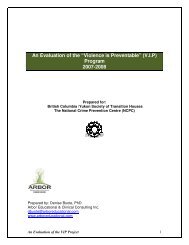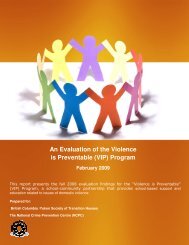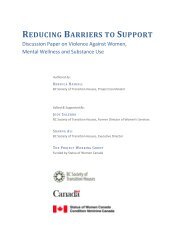a guide to supporting children exposed to domestic violence
a guide to supporting children exposed to domestic violence
a guide to supporting children exposed to domestic violence
Create successful ePaper yourself
Turn your PDF publications into a flip-book with our unique Google optimized e-Paper software.
Many women describe the so-called honeymoon phase as the most difficult<br />
because their partner’s promises <strong>to</strong> change or get help give the women hope. But<br />
the honeymoon isn’t really a honeymoon – it only describes some of the<br />
strategies that abusers use <strong>to</strong> persuade their partners <strong>to</strong> stay.<br />
During the tension phase many women describe “walking on eggshells” as they<br />
try <strong>to</strong> “keep the peace” and try <strong>to</strong> “get everything right” <strong>to</strong> avoid more abuse and<br />
more danger.<br />
Partner <strong>violence</strong> is often a family secret<br />
Abusers sometimes seem charming in public; no one realizes what they are like at<br />
home. Your abuser may forbid you <strong>to</strong> see family or relatives, or may use<br />
manipulative tactics <strong>to</strong> prevent contact with friends and relatives. You feel isolated<br />
and alone. Your partner’s behaviour may make it impossible for you <strong>to</strong> have a<br />
career or job.<br />
The <strong>violence</strong> may make parenting difficult<br />
The threats of abuse and constant criticism may undermine your authority and<br />
make it hard for you <strong>to</strong> be an effective parent. As a result, you may find yourself<br />
being <strong>to</strong>o lenient with the <strong>children</strong>, or getting very angry with them.<br />
• Your partner may allow the <strong>children</strong> <strong>to</strong> be disrespectful or rude <strong>to</strong> you, and<br />
encourage them not <strong>to</strong> listen <strong>to</strong> you.<br />
• He may give in <strong>to</strong> them constantly, buy them <strong>to</strong>ys, and shower them with<br />
attention.<br />
• Or your partner may be angry, critical, or even abusive <strong>to</strong>wards the <strong>children</strong>.<br />
• He may demand that his needs always come first or that you should pay no<br />
attention <strong>to</strong> the <strong>children</strong> when he is at home.<br />
These fac<strong>to</strong>rs, plus being <strong>exposed</strong> <strong>to</strong> the <strong>violence</strong> <strong>to</strong>wards you, may make the<br />
<strong>children</strong> upset and their behaviour difficult <strong>to</strong> manage.<br />
How the impact of abuse can affect women’s health<br />
Women report that the impact of abuse can cause health problems and affect how<br />
they cope.<br />
Although every woman is affected differently by abuse, you may:<br />
• lose confidence in yourself, feel powerless and unable <strong>to</strong> make decisions<br />
HELPING MY CHILD A GUIDE TO SUPPORTING CHILDREN EXPOSED TO DOMESTIC VIOLENCE 11






